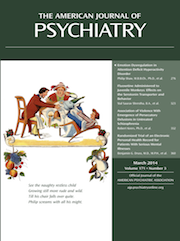Developmental Lag and Course of Cognitive Deficits From the Premorbid to Postonset Period in Schizophrenia
To the Editor: In their article published online September 13, 2013, Meier et al. (1) update earlier findings of their well-conducted population-based longitudinal study (2). Previously, the authors reported cognitive changes between ages 7 and 13 years and found that children who later developed schizophrenia had stable cognitive deficits that were already evident at age 7. The earlier report also provided evidence of change in other cognitive domains, as some children had more severe working memory and processing speed deficits at follow-up. In the present article, Meier et al. (1) extend their findings to age 38. This report has a number of strengths. It revealed that antipsychotic and illicit drug use could not explain the reported cognitive changes. It also provided some evidence of specificity to schizophrenia as no similar cognitive changes were found in clinical and healthy comparison groups.
However, there is a significant concern regarding this most recent report. The article presents the message that schizophrenia patients are losing acquired cognitive skills from the premorbid to the postonset period. The authors also suggest that decline is observed in fluid abilities but not crystallized abilities and imply that different pathophysiological mechanisms underlie these deficits. Such interpretations could be considered by many as strong support for neurodegenerative models of schizophrenia.
However, these findings should not be considered real evidence of cognitive decline in schizophrenia because of two important limitations. First, in most cognitive tests that were included, a more challenging version of the task was used at the follow-up assessment. Second, reported IQ results were based on the corrected norms. Previous studies also had the same limitations, and some studies used completely different tests at the follow-up assessment. Studies reporting follow-up data of raw scores of the same cognitive measures administered to patients with ultra-high risk to psychosis and patients with first-episode schizophrenia have not supported the idea of cognitive decline (3).
In reality, the evidence suggests that schizophrenia patients simply lag behind healthy individuals in cognitive development, and such cognitive changes are quite naturally more apparent for fluid skills than crystallized skills in adolescence and adulthood, as the development of advanced cognitive skills continues after age 13. There is no need for a different pathophysiological mechanism. In fact, the authors shyly acknowledge this in their discussion of the symbol coding findings; however, their main emphasis is cognitive decline. Cognitive deficits observed in schizophrenia can be best explained by problems in acquisition during neurodevelopment from birth to adulthood rather than by the loss of acquired abilities.
1 : Neuropsychological decline in schizophrenia from the premorbid to the postonset period: evidence from a population-representative longitudinal study. Am J Psychiatry 2014; 171:91–101Link, Google Scholar
2 : Static and dynamic cognitive deficits in childhood preceding adult schizophrenia: a 30-year study. Am J Psychiatry 2010; 167:160–169Link, Google Scholar
3 : Meta-analysis of cognitive deficits in ultra-high risk to psychosis and first-episode psychosis: do the cognitive deficits progress over, or after, the onset of psychosis? Schizophr Bull (Epub ahead of print, Jun 14, 2013)Google Scholar



